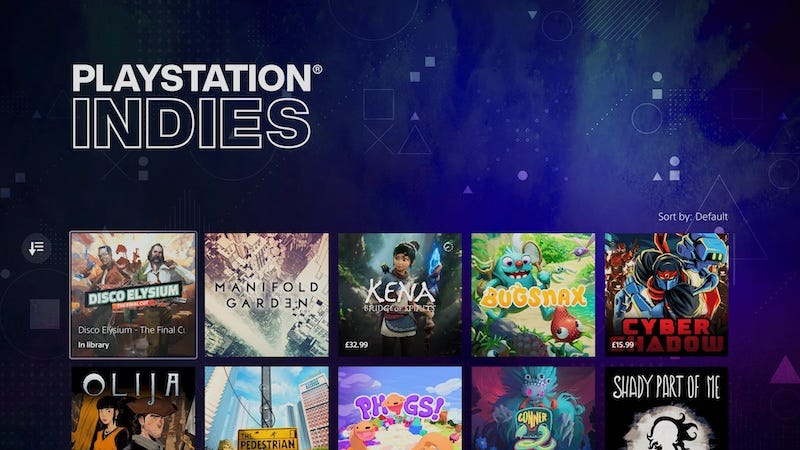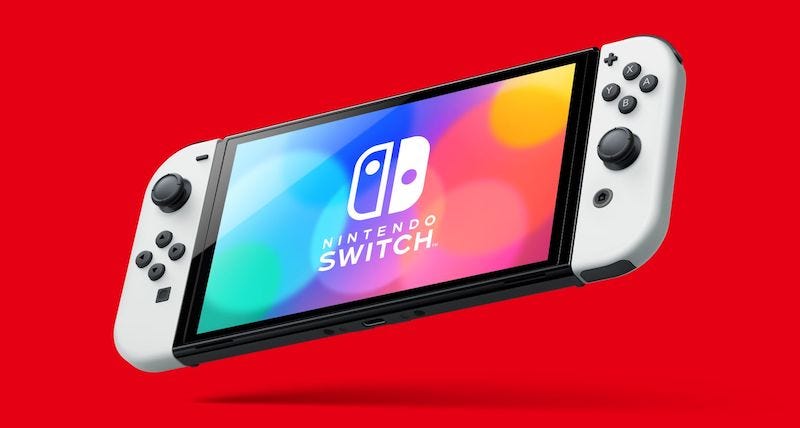What do devs really want from a game platform?
Publikováno: 6.7.2021
And why is Sony (apparently) coming up short?
[The GameDiscoverCo game discovery newsletter is written by ‘how people find your game’ expert & GameDiscoverCo founder Simon Carless, and is a regular look at how people discover and buy video games in the 2020s.]
Welcome back to the summer holiday times here on Planet Discovery. And there’s plenty of beach balls being hurled around our pool, as you’ll see when we get to the central point of this newsletter.
So, as you try not to get spiked in the face by the metaphorical projectile in question, let’s get on with today’s round-up of all things game discovery. (We’re doing a Tuesday & Thursday free newsletter this week, btw, due to Monday being a U.S. holiday!)
[PSA: did you spot we just launched our ‘Complete Game Discovery Toolkit’ eBook alongside a 20% off discount for new GameDiscoverCo Plus subscribers, and it’s only available for another 9 days? Go grab it before it’s too late, discovery acolytes.]
Game devs, support, discovery & game platforms
Sometimes, as a game’s creator and ‘the little guy’, you feel helpless in the face of ‘the big guy’. In this case, ‘the big guy’ is the game platform you’re publishing on, which I’ve chosen to depict as a giant enemy crab, for historically semi-amusing reasons.
Anyhow, those Tweets last week calling out Sony for being a frustrating platform partner as an indie ended up blowing up. They morphed a couple of different articles which added detail - ‘PlayStation is hard to work with’, from John Walker at Kotaku, and ‘Why indie publishers are fed up with PlayStation’, from Rebekah Valentine at IGN. (Also notable: this Push Square report by Liam Croft.)
Each compiles existing information, but supplements it with additional quotes and context. All are well worth reading. The crux of the argument is that many independent games sell less on Sony platforms than other console and PC platforms. But Sony is also significantly more difficult to work with than those other platforms.
Rather than double-down on the Sony bashing specifically, I thought it might be useful to take it up a level, and try to define the major features that make up a good developer <-> platform experience.
If you can define those, you can iterate and improve those. I’ll also be throwing in the ‘generally perceived’ platform ranking, best to least best, for these features if you are a smaller independent developer. (It’s a little complex ‘cos of Game Pass, which is fundamentally changing the Xbox purchase intent experience.)
Back-end systems - access & features: do you need to talk to anyone to publish, discount, and service your game? Or is there a lot you can do just using dev-centric software and systems? What is the general quality/UI of that back end? And if you have a ‘blocking’ problem, does it get escalated to the right person or just hang out in the ether? (Ranking: Steam, Xbox+Switch, PlayStation.)
Point(s) of contact & responsiveness from platform staff: If you do have to reach out, can one person do the majority of things you need? Are they fast or slow, do they have to loop in other people? This is related to back-end platform features, since it can be difficult to get noticed by platform staff on all platforms, due to high volume of devs. (Ranking: Steam, Xbox, Switch - but 3 all close together, PlayStation.)
Availability and cost of development kits: if you want to develop on a platform, can you easily get dev kits, extra dev kits, etc? And are they expensive, or are there complex IP, address, or business specific needs? Related: should platforms be subsidizing and improving this process to make for better games? (Ranking: Steam [cos no devkit], Xbox, Switch, PlayStation.)
Access to sales/discounts: there’s two ways you can go here: ‘DIY discounts using the back-end, with some extra platform-organized sales’ (Steam and Switch), or ‘platform-organized sales only’ (Xbox and PlayStation). The former is far preferred by smaller devs, because it’s impossible to get left out. If the latter is the only option, it should be without excessive ‘back & forth’, haggling & other oddness. (Ranking: Steam, Switch, Xbox, PlayStation.)
Store ‘featuring’ - charts or editorial: if you have a good game but you don’t have deep connections on the platform, will people still see it in the platform store? Whether that be via dynamically generated top sales charts, editorial mentions or other elements? BTW, I think high-profile, dynamically generated sales charts are a vital part of this. (Ranking: Steam, Switch, Xbox - tho Game Pass has taken a front seat here, PlayStation.)
‘Natural’ store discoverability for your games: if people are just trying to find your games while browsing the store, are they likely to be recommended it? Might they see it easily in search results, have the interface expose it dynamically via ‘you played this, so you might like this’ recommendations, and so on and so forth? (Ranking: Steam, then a big gap to Xbox - which has been improving, PlayStation, and Switch is definitely last.)
After all of this, it also comes down to cold, hard facts, of course - units sold. And one thing potentially making PlayStation look worse for small indies here is that most ‘core’ PlayStation players are just not that interested in traditional/niche independent games, in my view. (Just look at PlayStation’s YouTube channel trailer comments, if confused.)
Yes, many games sell super well on PlayStation - there’s no reason for Sony to SadKeanu (see above). So when you see a title that sells, say, 50,000 copies on Steam, and then goes to Switch and does 5-10,000 units, and then that same game shifts 2,500 copies on Xbox and 1,000 copies on PlayStation? I think 70% of that issue is an audience mismatch.
Some ‘indie but AAA’-looking and PlayStation-audience centric titles can easily sell more copies on PlayStation and Xbox than Steam and Switch on a daily basis - even with all of the above platform problems. I’ve seen it multiple times, and I really don’t want people to overlook it. Also: PlayStation’s online store is ‘fine’ to browse if you’re a core customer looking for high-profile and featured games.
But say you’re a small or medium indie selling suboptimally, and you can’t discount that game at will - a significant source of additional units and revenue on Switch and Steam? And you never get invited to sales, and you can’t get a hold of your Sony rep easily, because the system doesn’t have DIY features, so they are overwhelmed.
And when you do get hold of them, it’s difficult and timeconsuming to get the things done that you want. And the back end is complex and archaic, too… look, you’ve got a ‘straw that breaks the camel’s back’ problem.
This is why these Sony issues are spilling out into public. And what in large part may be a longer-term technical and strategy architecture issue ends up feeling like a ‘Sony doesn’t care about me’ issue. I know they do care, and the IGN piece points that out, mentioning the PlayStation Indies initiative - which is lifting up many devs individually and via store editorial highlights.
But the real fix is making larger, strategic systemic changes - not just fixing and uniting current systems. That path could be via adding DIY discounts with strong store featuring for all devs, more real-time dynamic charts, making it cheaper and easier to get devkits, and reducing the amount of paid game ad slots in the PlayStation Store, in favor of unpaid organic/dynamic inventory.
Of course it’s not like the other console stores don’t have issues For Switch: poor long-tail sales unless larger discounts. For Xbox: Game Pass taking up ever-increasing dashboard space. But it’s via these methods that I think Sony will ameliorate these issues for smaller indies in the longer-term. (If that’s a priority for them, of course, given the strong revenue performance for PlayStation, even taking into account these issues.)
The game discovery news round-up..
There’s an obvious lead story for the game discovery links round-up today - see above image. But besides that, there’s a whole heap of other goodness about social media, platform discoverability, and more. So let’s get to it:
Yes, Nintendo’s OLED Switch was announced, and it’s more incremental than many were thinking. Please witness: “Nintendo has confirmed to The Verge that the new OLED Switch "does not have a new CPU, or more RAM, from previous Nintendo Switch models.” A fun alternative take here: Dakko Dakko’s Rhodri Broadbent notes: “Quietly developers, realising they won't need to manage and debug separate hardware profiles for their games, breathe a sigh of relief.” Wonder if possible chip shortages made Nintendo pull back from any larger update?
We have a lack of sales/play data on PlayStation & Xbox. So I appreciate PlayStation Time Tracker hacking together the Top 100 most-played PS5 games in May 2021 from their total pool of 6,000 (probably core!) players - Ratchet & Clank rocketing to #1, lots of GaaS titles crowding the Top 20. Plus here’s the overall Top 100 for May 2021 across PSN - no massive surprises, Genshin Impact and Rust: Console Edition are newer Top 20 mainstays, browse at your leisure.
A good discovery/feedback tip - Sergio Garces’ Next Fest results blog for Mech Armada notes “I received 200 pieces of feedback using the feedback button (you can press ‘F’ at any point in the demo)”. Also new & handy: in-game bug reporting tips from Industries Of Titan! And we published Monster Train’s methodology for this a few months back: “We had a UI element on screen at all times that said "press F8 to send us feedback." It opened a simple UI to type in your thoughts and automatically captured a screenshot, the player's log file, and the player's save game.”
After getting kicked around for the last suggested slider change, Humble Bundle tried again via this official blog post. As Kotaku explains: “…it will begin rolling out caps on donations that are more generous, but still prevent customers from sending all of the money they spend on Humble Bundles directly to charity.” Humble’s parent company is veery corporate nowadays, and interesting to note: “‘Operational costs, such as the cost of acquiring content, have risen dramatically,’ Humble Bundle boss Alan Patmore told Kotaku over email. He said the company does not share detailed financial data, but that it had raised $30 million for 224 charities in 2020.”
Microlinks: Amazon’s Lumberyard engine is being open-sourced as the Open 3D Engine, will hopefully improve (?) from there; Lurkit analyzes D&D Dark Alliance’s poor ‘long tail’ after its anticipated debut - we talked about this in a Plus newsletter recently; Facebook making a big deal out of using cloud gaming modestly: “People play our cloud-streamed games right alongside games in HTML5. And they shouldn’t have to think too hard about how the games are delivered.”
Finally, an unaired Apple WWDC 2014 skit - mini-episode of Curb Your Enthusiasm, really - with Larry David as ‘the App Approver’ has somehow appeared on the Internet. (It has at least one Nazi joke, so it was probably too hot for Apple?)
Anyhow, skip to 2 minutes in for ‘Larry arbitrarily and amusingly rejecting an Angry Birds clone’ - fake Finnish accents are alleged. And in the wake of the Apple/Epic lawsuit, this is certainly some relevant discoverability content, hah:
[We’re GameDiscoverCo, a new agency based around one simple issue: how do players find, buy and enjoy your premium PC or console game? You can subscribe to GameDiscoverCo Plus to get access to exclusive newsletters, interactive daily rankings of every unreleased Steam game, and lots more besides.]



